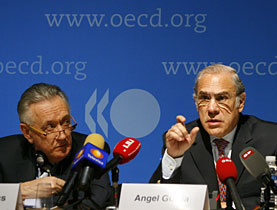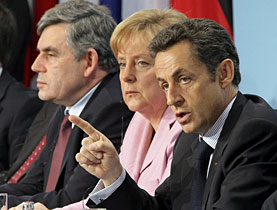OECD defends its position in tax dispute

The Organisation for Economic Co-operation and Development has rejected criticism that it wants to punish smaller countries, including Switzerland, in tax matters.
It is in Paris, the headquarters of the OECD, that the future of Switzerland as a financial centre will be decided over the coming months.
The OECD will take a close look at Switzerland’s position on fiscal cooperation and decide whether the country will remain on the so-called “grey list” of countries considered to only half respect OECD criteria in tax matters. Alternatively it could be put on the “white list” of countries above all suspicion.
The “black list” of non-cooperative countries no longer exists. The day after the G20 meeting in London, which ended on April 2, it included Uruguay, Costa Rica, the Philippines and Malaysia, which were accused of not respecting international norms in fiscal cooperation.
Five days later, there was a complete change: “These four countries have all pledged to introduce an exchange of tax information according to OECD norms,” said OECD Secretary-General Angel Gurría, with a note of satisfaction. All four will be transferred to the grey list.
Sharp turnaround
This is a sharp turnaround that adds fuel to the debate over the impartiality of the organisation. Is a telephone call to Gurría enough to see your country change from one list to another? The Philippines, Malaysia, and others, including Switzerland, were not invited to the G20 – can they be blamed for that?
On Tuesday, Gurría and his colleagues tried to explain the OECD’s position.
“The international norm, fixed by the OECD has not changed. It is the exchange of information on demand by a third country,” Gurría said. He said it was the climate that had changed, adding that he felt the days of absolute banking secrecy were over.
Criticised in Switzerland for putting the country on the same level as out and out tax havens, the secretary-general spoke of the difficulty of his work.
“Some countries announced progress five years ago but have done nothing since. We shall study their case much closer,” said Gurría, who recently cited the case of Panama.
Swiss concerns
This is one of Switzerland’s concerns. Given the seriousness with which it takes the easing of its own banking secrecy, it wants the OECD to be as demanding with Swiss “competitors”.
As for sanctions, Gurría says that the OECD does not impose sanctions because that is not its role. But on the basis of the OECD classification, some countries might be tempted to introduce sanctions against others.
The OECD emphasises its role of support, arguing that it wants to help countries adapt their legislation.
One word is still taboo in Switzerland – the “automatic” exchange of information.
“What the organisation [OECD] recommends is an exchange of information on demand,” notes Pascal Saint-Armand, who is responsible for fiscal cooperation.
“The exchange of information does not mean that whoever receives it will publish it in the newspapers,” adds Gurría. “Besides, a country can refuse to exchange [information] if it suspects the other of wanting to undermine confidentiality.”
swissinfo, based on an article in French by Mathieu van Berchem
Parliament did not appreciate the role played by the OECD in the establishment of tax haven lists. The economic affairs and taxation committee has invited the secretary-general of the organisation to a meeting in Bern.
The invitation was made two weeks ago but the OECD has not yet responded.
Switzerland also showed its dissatisfaction with the OECD by blocking €136,000 (SFr206,000) destined for the collaboration between the OECD and the G20. As part of the committee in charge of the budget, it refused a transfer with the support of Belgium, Luxembourg and Austria.
Switzerland is ready to withdraw its veto if the OECD assures it that the country will in future be informed when documents are transmitted to the G20, said Jean-Daniel Gerber, director of the State Secretariat for Economic Affairs (Seco).
Economics Minister Doris Leuthard protested against the behaviour of the organisation in a letter sent three weeks ago.
Jeffrey Owens, director of the OECD’s Centre for Tax Policy and Administration on Tuesday revealed the conditions that would allow Switzerland to leave the grey list.
Switzerland must conclude as many information exchange accords as possible before the next G20 summit in November, he said. Gurría previously had said that 12 such accords were required to make it to the white list.
“I won’t say the Switzerland will have a hard time if it does not do so,” Owens told Le Temps newspaper. “But I would certainly put the month of November into my diary.”

In compliance with the JTI standards
More: SWI swissinfo.ch certified by the Journalism Trust Initiative


You can find an overview of ongoing debates with our journalists here. Please join us!
If you want to start a conversation about a topic raised in this article or want to report factual errors, email us at english@swissinfo.ch.